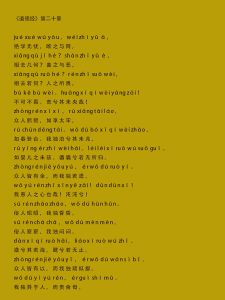Tao Te Ching Chapter 20

Original Chinese Text
唯之与阿,相去几何?
美之与恶,相去若何?
人之所畏,不可不畏。
荒兮,其未央哉!
众人熙熙,如享太牢,如春登台。
我独泊兮,其未兆;
沌沌兮,如婴儿之未孩;
傫傫兮,若无所归。
众人皆有余,而我独若遗。
我愚人之心也哉!
俗人昭昭,我独昏昏。
俗人察察,我独闷闷。
澹兮其若海,飂兮若无止。
众人皆有以,而我独顽且鄙。
我独异于人,而贵食母。
Pinyin (Pronunciation)
Wéi zhī yǔ ā, xiāng qù jǐhé?
Měi zhī yǔ è, xiāng qù ruòhé?
Rén zhī suǒ wèi, bùkě bù wèi.
Huāng xī, qí wèi yāng zāi!
Zhòngrén xīxī, rú xiǎng tàiláo, rú chūn dēng tái.
Wǒ dú bó xī, qí wèi zhào;
Dùndùn xī, rú yīng’ér zhī wèi hái;
Lěilěi xī, ruò wú suǒ guī.
Zhòngrén jiē yǒuyú, ér wǒ dú ruò yí.
Wǒ yúrén zhī xīn yě zāi!
Súrén zhāozhāo, wǒ dú hūnhūn.
Súrén cháchá, wǒ dú mènmèn.
Dàn xī qí ruò hǎi, liáo xī ruò wú zhǐ.
Zhòngrén jiē yǒu yǐ, ér wǒ dú wán qiě bǐ.
Wǒ dú yì yú rén, ér guì shí mǔ.
白话文翻译 (Plain Chinese Translation)
- 唯之与阿,相去几何?美之与恶,相去若何?
- 恭敬与呵斥,相差多少?美好与丑恶,又有多大区别?
- What’s the real difference between “yes sir” and “shut up”? Between beauty and ugliness?
- 人之所畏,不可不畏。荒兮,其未央哉!
- 人们所畏惧的,我也不得不畏惧。多么茫然啊,好像没有尽头!
- I must fear what others fear—how endless this absurdity!
- 众人熙熙…如春登台
- 众人兴高采烈,如同参加盛宴,如同春日登高赏景。
- The crowd cheers—feasting at rituals, sightseeing in spring.
- 我独泊兮…若无所归
- 唯独我淡泊宁静,无动于衷;混混沌沌,像还不会笑的婴儿;疲倦懒散,像无家可归。
- I alone am calm—unformed as a newborn’s smile, weary as a homeless wanderer.
- 众人皆有余…我愚人之心也哉!
- 众人都富足有余,唯独我好像有所遗失。我真是愚人的心肠啊!
- They all have plenty—I alone seem lost. What a fool’s heart I have!
- 俗人昭昭…飂兮若无止
- 世人都精明清醒,唯独我昏昏沉沉;世人都严厉苛刻,唯独我淳厚宽宏。
恍惚啊,像大海一样辽阔;飘荡啊,像没有止境。 - They shine bright—I dwell in shadows; they pick faults—I embrace blur.
Vast as the ocean, drifting without anchor.
- 世人都精明清醒,唯独我昏昏沉沉;世人都严厉苛刻,唯独我淳厚宽宏。
- 众人皆有以…而贵食母
- 世人都有所作为,唯独我愚昧笨拙。我独自与众不同,只重视回归本源。
- They all have purpose—I alone seem dull. Different from all, I nurse at the Mother’s breast.
Key Concepts Explained
- 食母 (shí mǔ) – Symbolizes returning to the Tao’s nourishing source (like an infant to mother).
- 愚人之心 (yúrén zhī xīn) – The “foolish” wisdom that sees beyond conventional values (呼应 Chapter 45’s “大巧若拙”).
- 未兆 (wèi zhào) – No predetermined plans, embodying wuwei.
Philosophical Essence
- Taoist vs. Conventional Mindset
对比维度 俗人 得道者 生活状态 熙熙攘攘 淡泊宁静 心智特点 昭昭察察 昏昏闷闷 价值取向 追求有余 甘愿若遗 终极归宿 世俗成就 贵食母 - Existential Loneliness
- The Taoist’s cosmic homelessness (无所归) contrasts with:
- Confucian social harmony
- Buddhist nirvana
- The Taoist’s cosmic homelessness (无所归) contrasts with:
- Reverse Enlightenment
- Chapter’s paradox: What society calls “foolish” (愚) is actually higher wisdom.
“While others climb the mountain, I sit by the stream—who’s really free?”
— Modern metaphor for verse 3’s feast vs. solitude contrast
